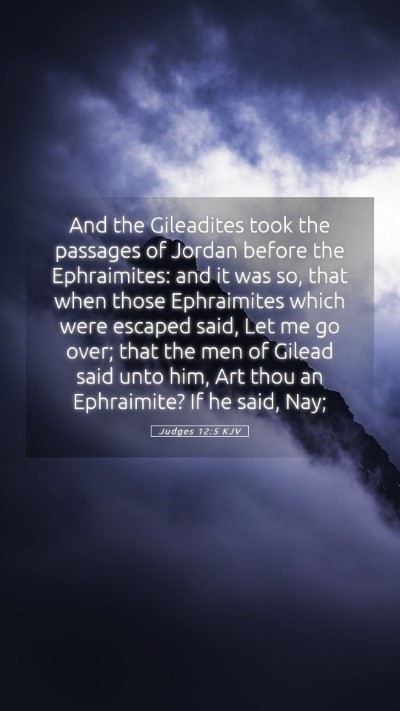Old Testament
Genesis Exodus Leviticus Numbers Deuteronomy Joshua Judges Ruth 1 Samuel 2 Samuel 1 Kings 2 Kings 1 Chronicles 2 Chronicles Ezra Nehemiah Esther Job Psalms Proverbs Ecclesiastes Song of Solomon Isaiah Jeremiah Lamentations Ezekiel Daniel Hosea Joel Amos Obadiah Jonah Micah Nahum Habakkuk Zephaniah Haggai Zechariah MalachiJudges 12:5 Meaning
What is the meaning of Judges 12:5?
And the Gileadites took the passages of Jordan before the Ephraimites: and it was so, that when those Ephraimites which were escaped said, Let me go over; that the men of Gilead said unto him, Art thou an Ephraimite? If he said, Nay;
Judges 12:5 Bible Verse Meaning
Bible Verse Commentary: Judges 12:5
Judges 12:5 - Context and Overview
The verse from the Book of Judges 12:5 recounts an important event in the history of Israel, centered around the conflict between the men of Gilead and the Ephraimites. This narrative exemplifies internal struggles within the tribes of Israel during a tumultuous period. It highlights the tension and division that can arise from misunderstandings and conflicting motivations.
Understanding the Characters and Events
Gilead and Ephraim: The men of Gilead stand as defenders of their territory and demonstrate a commitment to their cause. The Ephraimites, feeling excluded and diminished, come forward with accusations. Conflict arises based on perceived grievances rather than direct confrontation.
Insights from Commentaries
The interpretations of Judges 12:5 from various public domain commentaries offer rich insights:
- Matthew Henry: Henry emphasizes the concept of tribal loyalty and its potential pitfalls. He points out how the Ephraimites, despite their strength, felt insulted by not being included in the battle against the Ammonites. This was indicative of a larger issue of pride and tribal rivalry. The subsequent escalation reflects how such feelings can lead to broader conflict.
- Albert Barnes: Barnes analyzes the tactical decisions that led to conflict, examining both the strategic aspects of Gilead's response and the motivations of the Ephraimites. He underscores the importance of unity amid diversity within Israel and warns against the dangers of jealousy and factionalism that arise in fragmented communities.
- Adam Clarke: Clarke offers insight into the social dynamics at play, noting that misunderstandings can often ignite severe disagreements among groups. He highlights the necessity of communication and clarification, suggesting that many conflicts can be resolved through better dialogue and understanding.
Historical Context
This passage is set during the period of the Judges when Israel was governed by leaders chosen by God rather than a monarchy. The backdrop is essential to understand the nature of the conflicts—tribal identities were strong, and the lack of a centralized authority often led to local struggles for power and resources. Judges 12:5 reflects these societal tensions.
Application of Biblical Insights
The message of Judges 12:5 is applicable today in numerous ways:
- Conflict Resolution: This verse teaches about the importance of resolving differences with clear communication rather than allowing misunderstandings to escalate into conflict.
- Unity in Diversity: The division among the tribes serves as a reminder of the need for unity among different groups and communities today. Collaboration is essential for overcoming collective challenges.
- Pride and Jealousy: The Ephraimites’ reaction highlights the dangers of pride and jealousy, a lesson that's relevant for individuals and groups striving for cooperation and harmony.
Related Bible Verses
To enhance understanding of Judges 12:5, consider the following cross-references:
- Judges 8:1: Discusses the Ephraimites confronting Gideon.
- Judges 10:9: Details the oppression faced by the Israelites, reflecting the overall atmosphere of tension.
- Proverbs 13:10: Warns that pride leads to strife, closely connecting to themes found in Judges 12.
- James 4:1: Addresses conflicts originating from desires among individuals, resonating with Gilead's and Ephraim's situation.
Conclusion
Judges 12:5 encapsulates significant themes of conflict, identity, and the importance of unity among God's people. The combined insights from scholarly commentaries provide a multifaceted understanding of this biblical passage, emphasizing practical applications in our lives today. For readers seeking bible verse explanations, bible verse interpretations, and deep scripture analysis, this verse opens doors to rich exploration of bible study topics and guides.


